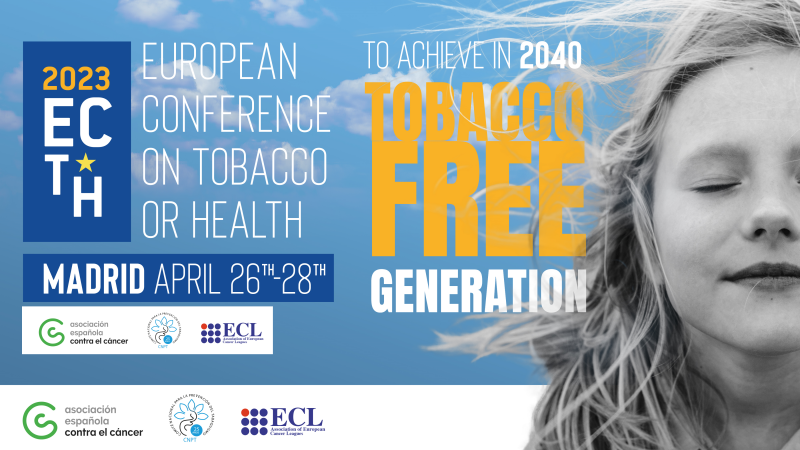
The 9th European Conference on Tobacco or Health in Madrid attracted hundreds of delegates from far and wide to consider how a ‘Tobacco-Free Generation’ could be achieved in Europe by 2040. IPH Public Health Development Officers, Dr Joanna Purdy and Dr Ciara Reynolds, were among the many delegates to present at the April conference. In this blog to mark World No Tobacco Day 2023, they share some insights from an upcoming report looking at the relationship between mental health and smoking.

Smoking and mental health
Later this year the Institute of Public Health plans to publish a new report on the relationship between mental ill-health and tobacco use in Northern Ireland. The report was developed for the Department of Health in Northern Ireland, as part of their review of the Ten Year Tobacco Control Strategy for Northern Ireland (2012-2022).
The report has two elements – the first element analysed Health Survey Northern Ireland data from 2018-2019, with the second element analysing current policy.
The data component included an analysis of the following mental health indicators: the General Health Questionnaire (GHQ); the Warwick-Edinburgh Mental Wellbeing Scale (WEMWBS); and self-reported use of medications for stress, anxiety or depression.
Mental Health Measures:
- Possible psychiatric disorder - GHQ score of ≥4
- Possible/mild depression - WEMWBS category 41-44
- Probable clinical depression - WEMWBS category <41
Across these indicators, we analysed data to evaluate the rates of smoking, wanting to quit, and ever tried quitting.
The policy analysis outlined the current policy landscape in relation to smoking and mental ill health in the UK and Ireland. We used the READ approach* (Dalglish et al, 2020) to collate and compare relevant health policies at local and national level.
What we found
In 2018/19, health survey data from Northern Ireland showed that among the general population:
- 18% currently smoked
- 31% used to smoke
- 51% had never smoked
- 18% had a possible psychiatric disorder
- 9% had possible/mild depression
- 10% had probable clinical depression.
Further analysis showed that the relationship between smoking and mental health was bi-directional.
This means that not only do people with mental ill health have higher rates of smoking but people who smoked also have higher rates of mental ill health.
For example, we found that around one in three people with a possible psychiatric disorder smoke but also that one in three people who smoke have a possible psychiatric disorder.
We also found that probable clinical depression was four times more common among people who currently smoke than among people who have never smoked (24% vs 6%) and almost three times as many people with probable clinical depression smoke compared to those without probable clinical depression (41% vs 14%).

In terms of quitting, our data indicated that overall, people with mental ill health have the same desire and intention to quit as people without mental ill health. One exception was people with probable clinical depression, where there was a lower proportion wanting to quit smoking compared to those without probable clinical depression (57% vs 70%). However, when we looked at whether they had ever tried to quit smoking previously, there were similar proportions to the rest of the population.
Where possible, we also looked at whether there were any differences in mental health indicators and smoking between those who lived in the ‘most’ and ‘least’ deprived areas of Northern Ireland. This analysis showed that those living in the ‘most’ deprived areas of Northern Ireland were two and a half times more likely to smoke and take medications for stress, anxiety, or depression than those living in the ‘least’ deprived areas (52% vs 21%).
Defining the problem
An analysis of policies across the UK and Ireland found that the relationship between smoking and mental health was acknowledged in most policies but that mental health was not always defined and understood in the same way.

Evidence suggests that too many people with mental ill health smoke, which can negatively affect their physical health.
When we took a deeper look at this we discovered that:
- Mental ill health is a risk factor for becoming a smoker
- Smoking negatively affects the effectiveness of psychiatric medications
- There are some misunderstandings about the likely mental health outcomes as a result of stopping smoking
- There may be barriers to accessing and engaging with stop smoking services for people with mental ill health.
On a positive note, many polices acknowledged that additional priority should be given to those who smoke and are living with mental ill health. However, none of the policies set a target or goal for reducing smoking among people with mental ill health.
Collaborative working
It is promising to see that new partnerships are developing between health service providers and community organisations working on smoking and mental health.
There are some good examples of integration and a shift towards local planning and commissioning in England, Scotland and Wales, as well as partnership approaches between advocacy organisations, such as, Action on Smoking and Health (ASH) and clinical / psychiatry bodies.
In Ireland, partner organisations in the mental health field have developed a ‘Let’s talk about smoking’ module and are advocating for the inclusion of Tobacco Free Campus policy implementation in future audits of mental health services.
Workforce development
Across the five nations, there was a strong focus on training for mental health service providers to ensure staff deliver best practice stop smoking support. For example, Ireland reported on the use of bespoke training for mental health service providers, whilst Scotland has endorsed the roll out of the ASH IMPACT advice and training programme for staff and volunteers engaging with people with mental ill health who smoke.
Service delivery
From our policy review, it was apparent that people with mental ill health do not always get the optimal support to stop smoking. When it came to designing stop smoking services, there was little or no consultation with those living with mental ill health or users of mental health services. We also found that none of the policies suggested that people with mental ill health should be offered bespoke stop smoking support.
Current policies acknowledge that it is important for people to easily access stop smoking services which are welcoming and understanding. People with mental ill health need better information about giving up smoking.
The Khan Review made a specific recommendation on communication and the importance of making people aware that smoking does not relieve stress or anxiety and that smoking cessation does not lead to a deterioration in their mental health (Khan, 2022).
The Scottish policy acknowledges that understanding smoking harms and using information to make decisions about health can be more challenging for some groups.
Where to from here?
For too long, it has been the view that quitting smoking might be harmful or too challenging for people with mental ill health. It is positive to see that this view is being challenged and that change is afoot.
Nonetheless, there are opportunities to build on and expand existing prevention measures and treatment services, such as:
- effectively focusing attention and resources at policy level to reduce smoking-related harms among people with mental ill health
- building partnerships with mental health advocacy and professional organisations leading on delivering mental health services
- assessing ‘best buys’ for investment in training of service providers building on existing good practice
- modifying public awareness and messaging to engage people with mental ill health who smoke
- facilitating access to support
enhancing assessment of risk from smoking-related harms among people with mental illness.
Mental Health Support Services
If you are experiencing mental health issues, help, support, and information is available from a wide range of organisations.
- Northern Ireland: The Public Health Agency has developed a directory of mental health services on its Minding Your Head website.
- Ireland: This list from the Health Service Executive details support and information services.
Stop Smoking Support Services
If you, or a loved one, require help to quit smoking, the following support and information is available:
- Northern Ireland: Stop Smoking NI
Ireland: Quit.ie
References
Dalglish, S. Khalid, H. and McMahon, SA. (2020) Document analysis in health policy research: the READ approach. Health Policy and Planning 35 (10) 1424–1431. Available at: https://academic.oup.com/heapol/article/35/10/1424/5974853
Khan, J. (2022) The Khan Review. Making smoking obsolete. Independent review into smokefree 2030 policies. Available at: https://www.gov.uk/government/publications/the-khan-review-making-smoking-obsolete
Footnotes
*READ approach - this is a systematic way of collating documents and extracting information in the context of health policy at local, national or global level.
- Ready your materials
- Extract data
- Analyse data
- Distil your findings.


